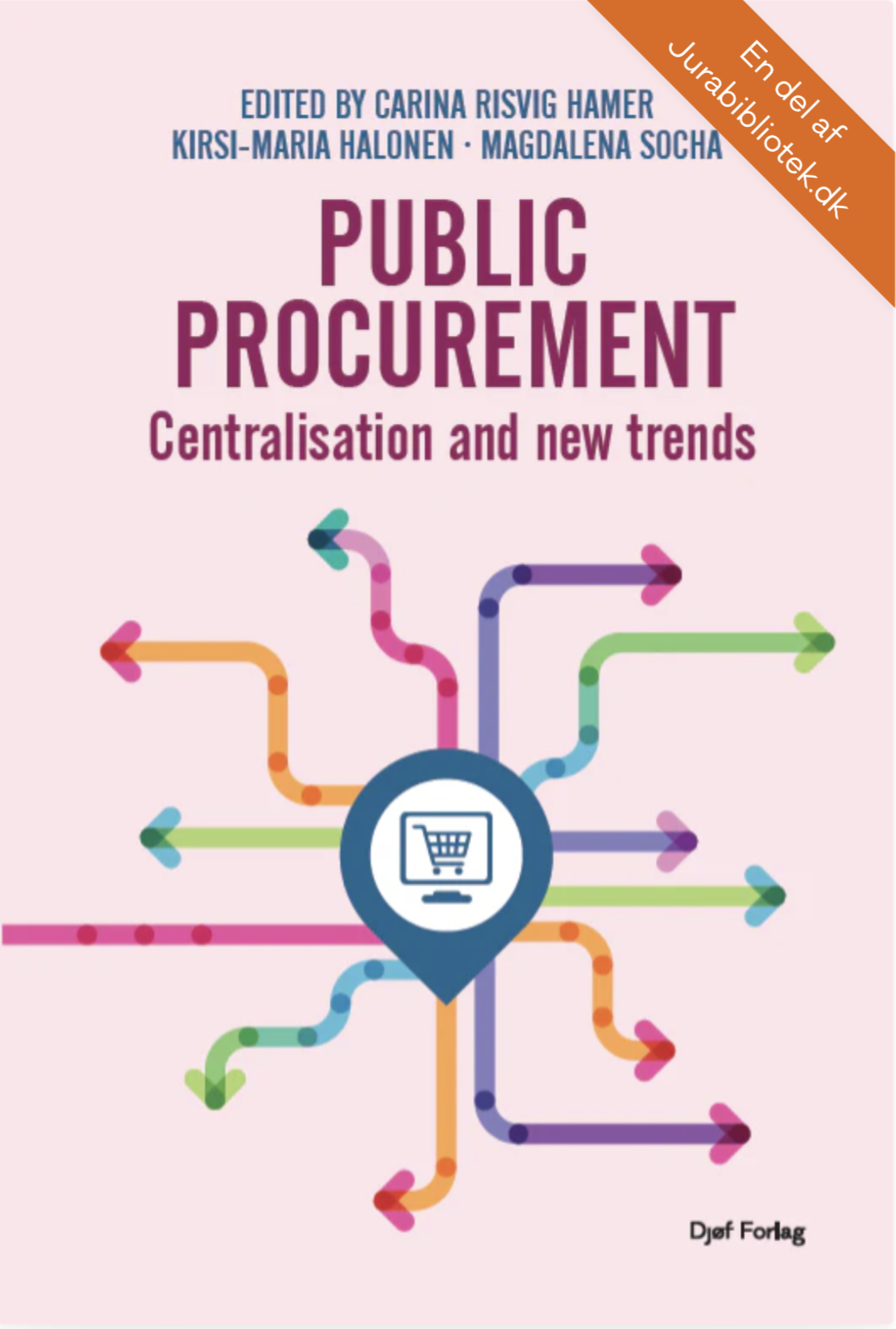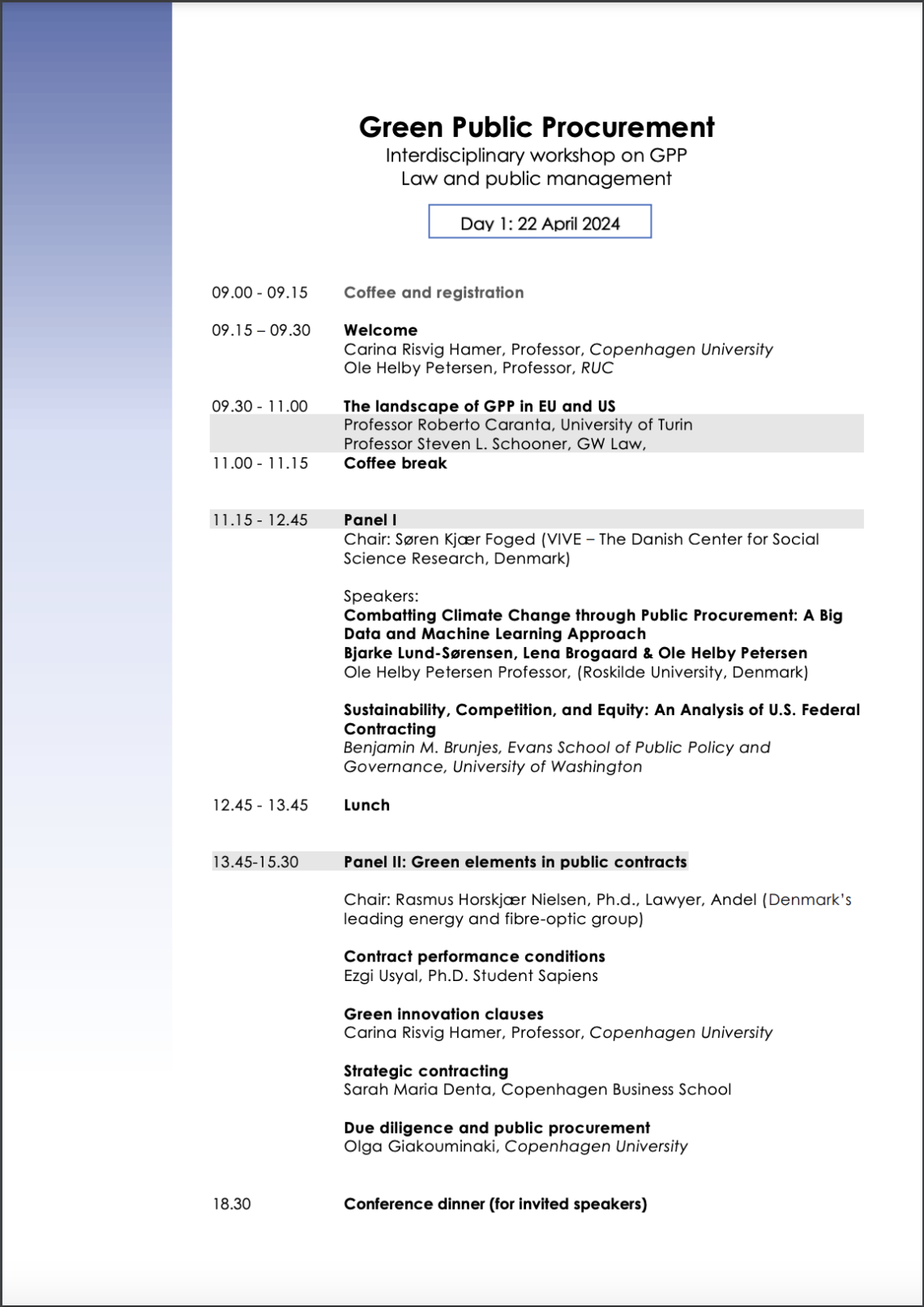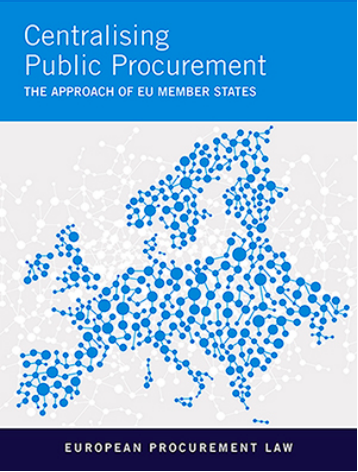Upcoming Conference: EU Public Procurement anno 2025 – Are the Rules Fit for Purpose? 🗓
The CPB-Project, and EPLG member, Prof. Carina Risvig Hamer, are proud to host the upcoming Public Procurement Conference, EU Public Procurement anno 2025 – Are the Rules Fit for Purpose? 📅 Dates: 23 April, 9:00 – 24 April, 15:00 📍 Location: Auditorium 4A.0.69. Njalsgade 76, 2300 Copenhagen S 💼 Registration: Register here no later than 16 April at 10:00 (Conference attendance is free) 🍽 Conference Dinner: Register here – cost: 500 DKK The full agenda is available here. This two-day event will gather practitioners, researchers, and policymakers to explore emerging challenges in EU public procurement and discuss how the rules should evolve to meet future needs. Besides Carina Risvig…
New book ‘Public procurement – Centralisation and new trends’
EPLG members, Profs. Carina Risvig Hamer and Kirsi-Maria Halonen co-edited the book ‘Public Procurement- Centralisation and new trends’, published by the Danish publisher Djøf Forlag in April 2024. The book ‘Public Procurement- Centralisation and new trends’ is part of the research project, Safeguarding competition and equal access to Central Purchasing Bodies’ agreements, known as the CPB Project and funded by the Independent Research Fund Denmark. The publication contains many contributions within the area of centralisation and new trends in public procurement, also based on presentations given at a conference organised in 2023 as part of the CPB Project.
On 22 and 23 April the University of Copenhagen will host an international workshop on Green Public Procurement
On 22 and 23 April 2024, the University of Copenhagen will host the interdisciplinary workshop ‘Green Public Procurement’, addressing GPP law and public management. This Interdisciplinary green public procurement workshop aims to address current developments and issues in the field of green public procurement. The two-day workshop will bring together researchers within law and public management from the US, Europe and Scandinavia to discuss green public procurement from different perspectives. The workshop is part of the research project PROCUREGREEN funded by the Independent Research Fund Denmark. PROCUREGREEN is a collaboration between Roskilde University, The Danish Center for Social Science Research (VIVE) and the Faculty of Law, University of Copenhagen. Several…
Centralising Public Procurement. The Approach of EU Member States
This timely book examines the ever-increasing prevalence of Central Purchasing Bodies (CPBs), analysing their use and structure across different EU Member States. It argues that since CPBs are only partially regulated at EU level, their operations will depend on the legislation of the individual Member States and more importantly on the States’ distinct practices and traditions. Comparative contributions consider the legal nature and structures of CPBs across 12 Member States and the UK.
Privacy Overview
This website uses cookies to improve your experience while you navigate through the website. Out of these, the cookies that are categorized as necessary are stored on your browser as they are essential for the working of basic functionalities of the website. We also use third-party cookies that help us analyze and understand how you use this website. These cookies will be stored in your browser only with your consent. You also have the option to opt-out of these cookies. But opting out of some of these cookies may affect your browsing experience.
Necessary cookies are absolutely essential for the website to function properly. These cookies ensure basic functionalities and security features of the website, anonymously.
| Cookie | Duration | Description |
|---|---|---|
| cookielawinfo-checkbox-advertisement | 1 year | Set by the GDPR Cookie Consent plugin, this cookie is used to record the user consent for the cookies in the "Advertisement" category . |
| cookielawinfo-checkbox-analytics | 11 months | This cookie is set by GDPR Cookie Consent plugin. The cookie is used to store the user consent for the cookies in the category "Analytics". |
| cookielawinfo-checkbox-functional | 11 months | The cookie is set by GDPR cookie consent to record the user consent for the cookies in the category "Functional". |
| cookielawinfo-checkbox-necessary | 11 months | This cookie is set by GDPR Cookie Consent plugin. The cookies is used to store the user consent for the cookies in the category "Necessary". |
| cookielawinfo-checkbox-others | 11 months | This cookie is set by GDPR Cookie Consent plugin. The cookie is used to store the user consent for the cookies in the category "Other. |
| cookielawinfo-checkbox-performance | 11 months | This cookie is set by GDPR Cookie Consent plugin. The cookie is used to store the user consent for the cookies in the category "Performance". |
| viewed_cookie_policy | 11 months | The cookie is set by the GDPR Cookie Consent plugin and is used to store whether or not user has consented to the use of cookies. It does not store any personal data. |
Functional cookies help to perform certain functionalities like sharing the content of the website on social media platforms, collect feedbacks, and other third-party features.
| Cookie | Duration | Description |
|---|---|---|
| __cf_bm | 30 minutes | This cookie, set by Cloudflare, is used to support Cloudflare Bot Management. |
Performance cookies are used to understand and analyze the key performance indexes of the website which helps in delivering a better user experience for the visitors.
Analytical cookies are used to understand how visitors interact with the website. These cookies help provide information on metrics the number of visitors, bounce rate, traffic source, etc.
Advertisement cookies are used to provide visitors with relevant ads and marketing campaigns. These cookies track visitors across websites and collect information to provide customized ads.
Other uncategorized cookies are those that are being analyzed and have not been classified into a category as yet.





